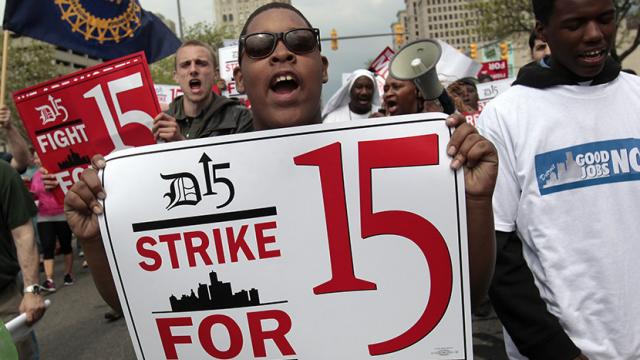
To mark Labor Day, professors WIlliam E. Forbath and Brishen Rogers published an op-ed in The New York Times arguing that labor law should be an important political objective in rejuvenating worker activism. Although labor unions overall are in a state of decline, there is significant activism pushing for raising minimum wages – for example, Fight for $15 – and related efforts to support workers. And in urban areas and some economic sectors, there are still a significant number of unionized workers, while at the same time workers in other industries are attempting to organize.
This activity is important for unions of course, but it is also important for working people and the middle class in general because unions have always played crucial roles in progressive movements. That is why business elites and their allies in government have consistently worked to undermine them. Per Forbath and Rogers: “Without a rejuvenated labor movement, it’s almost inconceivable that breakthrough reforms will come to pass.”
But to play a significant political role, labor must have the ability to organize workers. This has been significantly circumscribed over the years by the Taft-Hartley Act as described by Rich Yeselson in a 2013 article titled Fortress Unionism.
Forbath and Rogers describe other problems in labor law that go back even further and are particularly problematic given the structure of employment and work in the service-dominated economy. Existing labor law assumes that bargaining takes place between employers and those who are employed by them on site. In the manufacturing era, this made sense, but now that most places of work employ a small number of workers, the chances of successful worker-management negotiations are severely limited.
Moreover, the existence of sub-contract and temp work, whereby workers on site are not actually employed by the site’s owners, further limits the possibility of bargaining. Jobs in the “gig economy” also do not conform to simple assumptions about labor-management relations.
The solution, then, as Forbath and Rogers see it, is to rewrite labor laws to allow for different modes of collective bargaining. One reform they envision would allow for multi-employer bargaining among companies in a single industry. So, for example, all fast-food workers could bargain together against McDonalds, Burger King, Chipotle, and the other chains. They believe this might be acceptable to the fast-food companies because they would all be subject to the same agreement and therefore none would gain or lose anything from such bargaining in terms of competitiveness with the others.
Forbath and Rogers also think that more workers could be brought into formal labor-management bargaining by changing the definition of employers and employees to include contract workers as well as Lyft and Uber drivers.
No doubt, some skepticism is warranted here. It is not clear that fast food chains would gain anything from such bargaining. They would have to pay workers more and grant them better working conditions and schedules as well as provide costly benefits. Even more problematic, the likelihood of getting any sort of pro-labor legislation through Congress is remote.
Still, as the piece indicates, there is a lot of interesting activity going on outside of the workplace. A group called Fast Food Forward is trying to organize fast-food workers on the streets and through social media. This is a creative model that bears watching. At the same time, Forbath and Rogers are correct that progressive groups and democrats should be investing much more energy in changing labor law. It’s an issue that has almost no visibility, but has great potential to mobilize workers and their allies and to eventually provide organized support for other progressive causes. Modified labor laws could lead to many victories, not just a $15/hour minimum wage.
In “A Guide to Rebuilding the Democratic Party, from the Ground Up,” social movement scholar Theda Skocpol argues that the decline of unions at the local level in working class communities has been a huge loss for the Democratic Party. For several decades unions with their full-time staffs, mobilized workers, and budgets for political work could reliably turn out democratic voters at election time. Skocpol’s solution to this dilemma is to rebuild democratic organizations at the state and local level in order to fill this institutional gap as quickly as possible for 2017 and 2018 elections.
In a previous post, I argued that there are other progressive organizations already stepping in and appear to have significant staying potential, even though they are mostly new and untested. New types of labor activism appear to fit quite well into this dynamic scene and reforming labor law should be a high priority among progressive activists and progressive members of Congress to cement those gains whenever possible.
3 WAYS TO SHOW YOUR SUPPORT
- Log in to post comments












